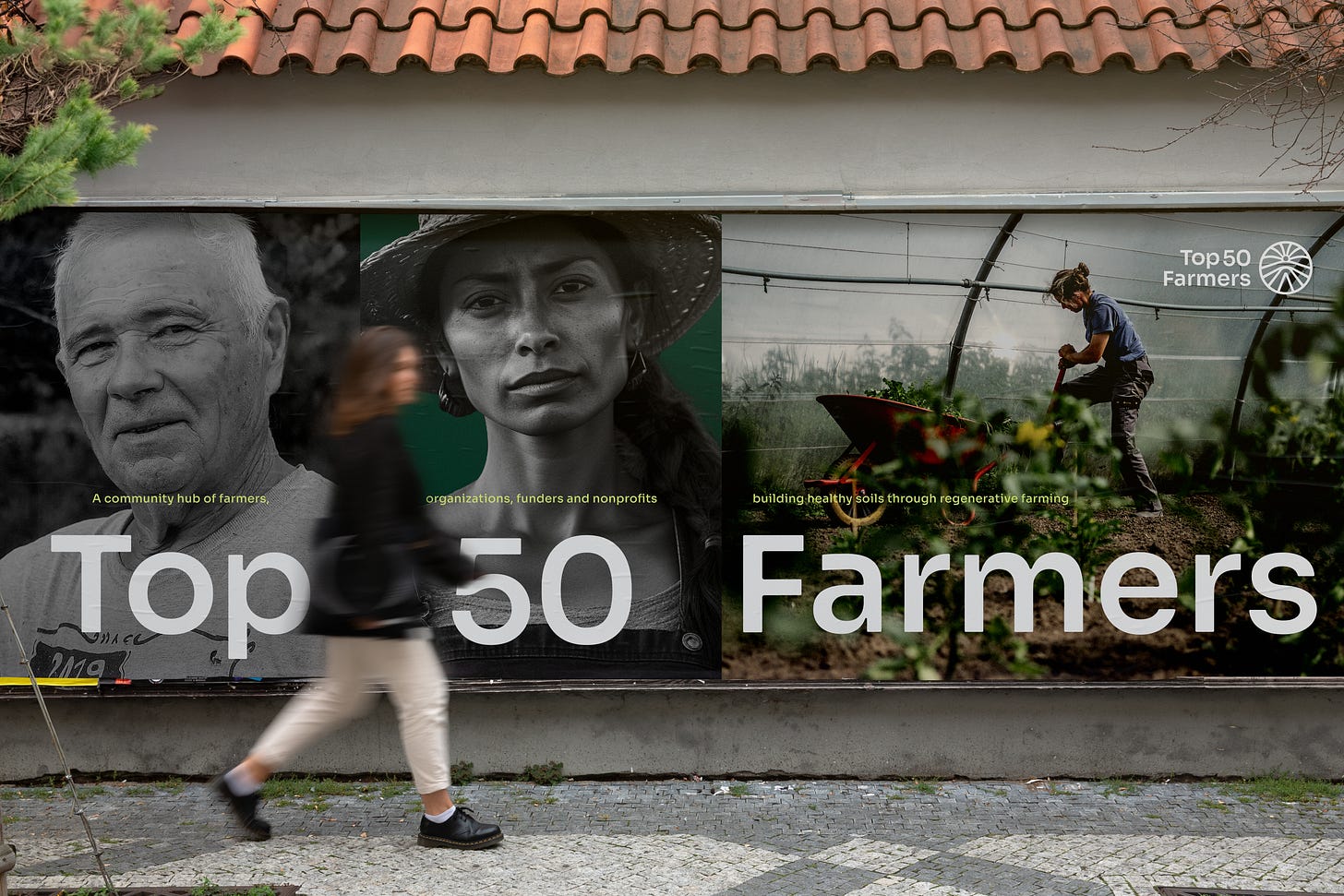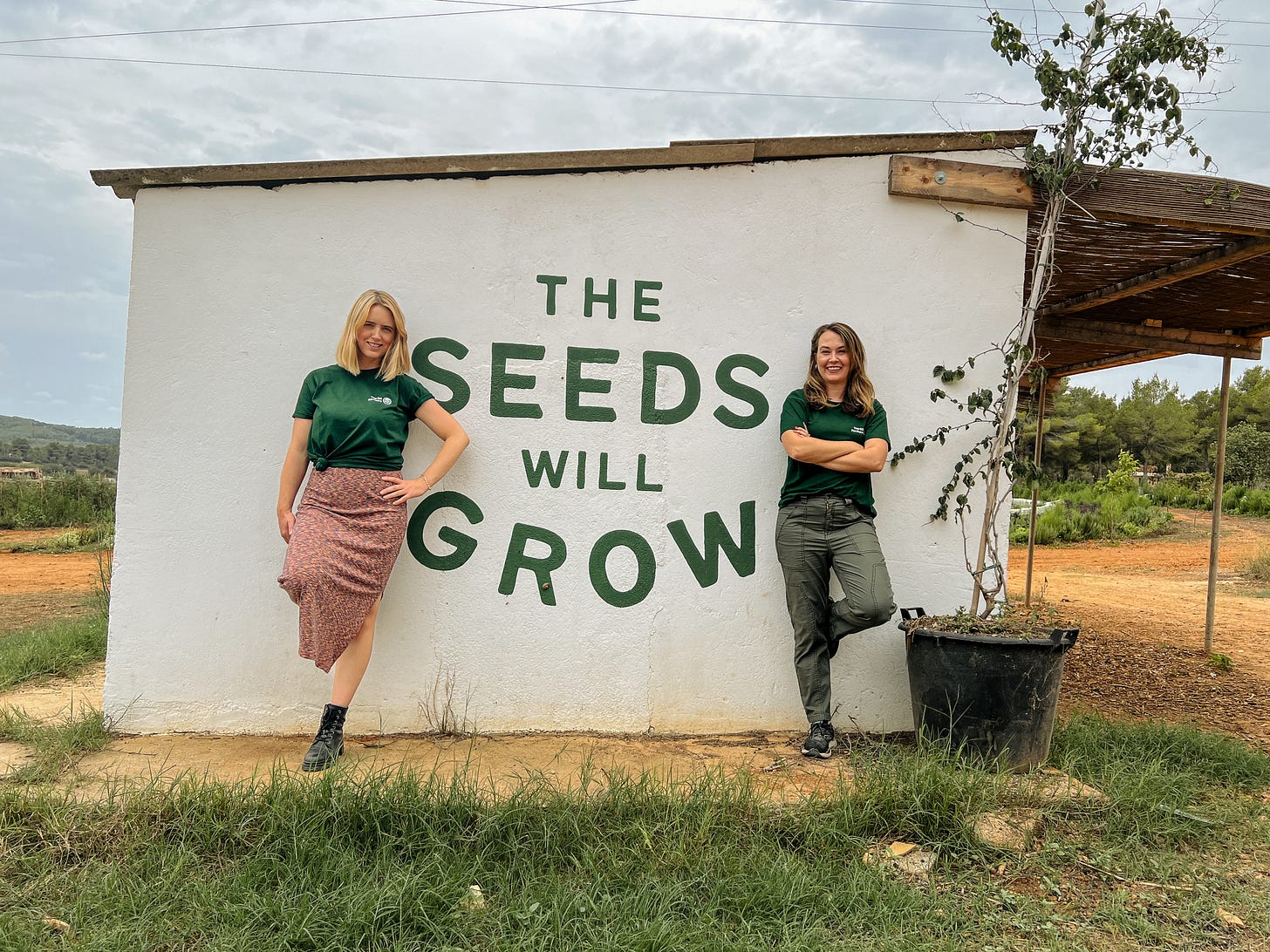Nominate a Regenerative Farmer
Move over, chefs. The spotlight is ready for green thumbs...
Welcome back to The Link, a bi-weekly circularity newsletter making the connection between regenerative farming and you, every other Tuesday.
If you’re the kind of foodie who has a scary amount of tabs open on the latest restaurant rankings, you’ve likely heard of spots like Atomix, Quintonil, or Noma because of The World’s 50 Best Restaurants list. And if you’re a chef with a restaurant on that list, your whole universe has been magnified: financially turbocharged, busy as hell, and made you a celebrity overnight (I see you, Twista). And if you’re like me and caught up on the latest season of The Bear, tv that’s showcasing the good, the bad, and the ugly chef culture food media has generated, you’ll agree that Carmie and his crew are nowhere near hitting the World’s 50 Best list, but you’ll also notice the lack of nods to farmers on the show. So when or how do we push the same chefs as rockstar visibility towards all the farmers who are growing all of our food?
Thankfully, Top 50 Farmers is a brand new digital platform that seeks to do just that: accelerate regenerative farming practices across Europe, serve as a community hub to inspire the next generation of farmers, and create new pathways of opportunity for profitable and resilient farm businesses. Their first year of nominations is officially open on the platform. I recently had the chance to sit down with Top 50 Farmers’ co-founders, Cindie Christiansen and Analisa Winther to discuss their vision, understand how the program works, and check the vibe on regenerative farming’s cultural status in Europe right now.
So what inspired you to start Top 50 Farmers?
Cindie Christiansen: I was attending a summit in the Danish countryside in 2022 that was all about ways of scaling regenerative agriculture in Europe. The gathering was a mixture of chefs, investors, and thought leaders in the space. In breakout sessions, we got to talk about how the food industry shift has developed, where certain chefs and restaurants have been able to become voices of change and diversify their financial platforms as a result. It was very inspiring, and as we talked about it all, we asked ourselves: why don't we do the same for farmers?
People travel all over the world to eat and to meet the chefs behind the Top 50 Restaurants. Why are our farmers not recognized in the same light? So that's kind of the idea behind Top 50 Farmers. I knew Analisa from other projects, so when I went back to Copenhagen, we went out for dinner and discussed the idea. As we really thought about it, we wondered how we could create some deep roots in the space for a project that helps bring resources back to farmers, and thus, Top 50 Farmers was born.
Analisa Winther: Recognizing farmers for all that they do is super important. And in the European context, it’s critical to uplift diverse role models, because less than 12% of farmers in the EU are under the age of 40. We already have a generational crisis in terms of young people not wanting to enter this field because of the dominant narrative that’s being reinforced: it's not sexy, because it has a bad reputation, because they're told you're not going to make a living and you're going to do back breaking work. That's not totally true. We all know farmers who are living a different reality. Of course there are challenges, but they're finding a way forward and redefining what this industry looks like and transforming it from the ground up. Role models matter. It’s giving credit where credit is due.
Amen! At the moment, regenerative farming is such a loosely based term in the United States that has some basic semblance of unified understanding. If you were going to describe the term from a European lens, how would you define it?
AW: I think there is no common definition. But if we just look at the word regeneration, I think it says it all. We work with nature instead of against nature. And of course, the big question in regenerative agriculture is: are we using chemicals or not? In our framework at Top 50 Farmers, we believe in a food system where there's no synthetic fertilizers. Beyond good soil health, of course, we understand that it's a journey for many farmers. We know there are so many farmers out there who are on their way, and I think we cannot leave them out of the conversation right now.
When farmers apply to be a part of our program, we have a few criteria: One is that you need a clear plan for how you're phasing out agrochemicals within your practice. You may not be there yet, but there should be an intention and a plan for how you're going to move forward. We’re focusing on setting a high bar in what we believe the future can be. And then as an organization and a platform, how can we provide a system of support? Employing regenerative practices is a journey. It's a lifestyle in terms of how you think and see the world.
CC: We’re also aiming to inspire so many more farmers around Europe. I hope that Top 50 Farmers will be a platform that can serve to support, understand, and collaborate with farmers. Even with our social media, it is meant to be an inspiration hub. Multiple people have already written in with a few posts who have expressed things like “I'm so excited about this because I've been seeking inspiration and I don't know where to look.”
In a sense, it feels like you’re building a digital European farming community, too. OK so let’s say I’m a farmer and I’m perusing the Top 50 Farmers site. Can you walk me through how it works?
So when you apply, you're applying to be part of our recognition program. A key piece to understand is that it’s not a ranking system. There’s no number one farmer, but instead the goal is that every year we find 50 role models with diverse farm models. And then next year, we're going to find 50 more. And by doing that, we have that +1 of the network effect of constantly adding more examples and growing this network and movement. When you join the recognition program, we help to focus on raising awareness around your story, your brand, and amplifying it. You’ll get access to networking opportunities in person and offline, which is really about sharing your own knowledge and also learning from peers in the group. Especially in a European context, there can always be language barriers, so we’re also creating different pathways in access to marketing and market opportunities and financing because we know that many of these businesses, like they are innovating in terms of what is the future of regenerative agriculture look like, and really what is the future of owning a farming business and running that. We need different financial products and services and bigger or easier access to the market in ways that make sense.
For each cohort, we analyze the data of what those farmers write and in their application in terms of where they're looking for support and then design the program specifically for that cohort. So we don't want to do something top down and just assume farmers need this. We want to listen and then help pull in resources because we know the right people. We’re going to tailor these cohort sessions to fit their needs.
From your perspectives, what are the broad strokes of issues farmers are generally facing in Europe in terms of adapting to regenerative practices?
We are looking into the same challenges that the U.S. is facing. Access to land is a major challenge, but also just farming through climate change: we have a lot of rain in the northern part of Europe that makes it very challenging in the southern region where they’re having to dry farm. When we’re connecting with farmers, we're asking questions like: “What do you need to scale or improve your practices?” “Is there an areas where you’re lacking in education?” Top 50 Farmers is all about creating a landscape to map where farmers are and figure out what resources they need to face these really big challenges.
AW: I’ll build on that just by saying that in the US, we've come further along in terms of consumer awareness, that if you walk into Whole Foods or a grocery store, you have regenerative organic certifications and quite a few products that are labeled with that so consumers know to look for that or buy it. In Europe, maybe some people know what regenerative is, but it's a bit more fringe and newer as a term that’s not widespread across European nations. So it does, from that point of view, feel way earlier than the regenerative awareness progress in the United States.
What do you think are one or two of the biggest barriers to regenerative farming adaptation in Europe?
One of them is the subsidies that are given out that prevent farmers from adapting to regenerative practices. It also means that regeneratively grown food becomes really expensive compared to big ag produce, but there’s also the issue of the transition. Their financial earnings are already so low. So while we even might pay a good price for that product, they likely don't have that extra money to do the transition. So there's something in our whole conversation about the transition period that needs to be addressed. And then I would say that we need to try to solve the cultural barriers. If you think about your favorite chef, it’s pretty easy to name one, but if you ask someone who their favorite farmer is, they can’t name a single name. We want to bring respect, cultural awareness, and then aim to figure out all of these other pieces like politics, financing, and market awareness. For me, it starts with people having an overall understanding of how important this is, and really why it matters, and why we should celebrate farmers and appreciate them, versus blaming them and telling them, here's all the ways you should do better, because there's one million ways to improve.
AW: I’d also just add that our words carry power. How we think about things and frame things informs everything we do in the worlds that we build. We try to be as careful as possible about really thinking about what words we are using and why, and what narrative that is reinforcing.
Thanks so much for speaking with me!
To learn more about Top 50 Farmers or to nominate a farmer, head over to their site. Nominations are open until December 12, 2024.




💚